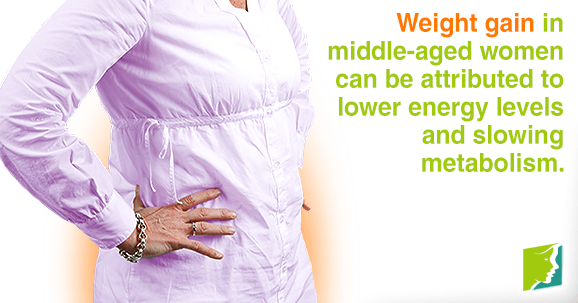As women approach middle-age, they often find they gain weight, sometimes even if their lifestyle has not changed. There are a number of reasons for this trend, and it is by no means uncommon. However, it is still worth getting help and advice to avoid or reduce weight gain, as it can pose some serious risks to health. With a few simple lifestyle changes, many women find that the weight gain can be safely and sustainably reversed. Keep reading to find out more about weight gain in middle-aged women.
Why Am I Gaining Weight?
Weight gain in middle-aged women cannot be attributed to one single factor, but rather, there are many different contributors at work. Obviously, each individual will have her own reasons for weight gain, but there are a few general things that play a large role in weight gain as women get older. The mains reasons are:
Natural reduction in energy levels
As women approach middle-age, most are no longer as energetic as in their younger days, and this can have an impact on levels of physical activity. The logic here is pretty self-explanatory; the less exercise a woman does, the more weight she will gain. As a result, this aspect is relatively easy to deal with - increase physical activity and decrease weight.
Estrogen imbalances
Hormonal imbalances also play a role in weight gain. As many middle-aged women are going through menopause, this time of life can be beset by estrogen imbalances, which causes a shift of fat deposits from the hips to the waist. This can result in menopausal weight gain.
Slowing metabolism
With age comes a natural decrease in muscle mass and metabolism. Unfortunately, this means that weight gain can occur, even if dietary and lifestyle habits have remained the same. In short, a woman now needs fewer calories to maintain the same weight, which might take some getting used to. In addition, losing muscle mass can also contribute to weight gain, as the muscle turns to fat.
What Are the Risks?
It is well-known that too much weight is bad for overall health, and weight that is over or under the safe boundaries should be avoided. However, it is even more important for middle-aged women, as age comes with an increased likelihood of certain health complaints in any case, and weight gain can exacerbate these problems. A couple of examples are:
Psychological consequences
Many middle-aged women who gain weight subsequently suffer from low self-esteem and embarrassment, and often say they feel judged by society. This can lead to feelings of anxiety or depression, which can spill over into other areas of life and even sometimes turn into clinical disorders. These feelings will usually be exacerbated if a woman is also going through menopause and is experiencing hormonal fluctuations.
Cardiovascular disease
If the body is carrying too much weight, the heart has to work harder to pump oxygen to all the cells, and this results in increased blood pressure. This can lead to a variety of health problems, some long term or even life-threatening. In addition, the extra stress that the heart is under increases the chances of heart disease.
Weight gain in middle-aged women is common but should not be ignored. In order to avoid the health problems that can accompany too much weight gain, healthy lifestyle choices should be implemented. It might help to see a doctor and ask for ways to lose weight safely and get advice on local services. Read more about approaches for treating weight gain.
Sources
- Better Health Channel. (2013). Menopause and weight gain. Retrieved November 7, 2014, from http://www.betterhealth.vic.gov.au/bhcv2/bhcarticles.nsf/pages/menopause_and_weight_gain
- Cleveland Clinic. (2014). Health & Prevention. Retrieved November 7, 2014, from http://my.clevelandclinic.org/heart/prevention/nutrition/weight-management/weight-management-tips.aspx
- Mayo Clinic Staff. (2013). Healthy Lifestyle: Women's Health. Retrieved November 7, 2014, from http://www.mayoclinic.org/menopause-weight-gain/ART-20046058?p=1
- Mayo Clinic Staff. (2013). Menopause weight gain: Stop the middle age spread. Retrieved November 7, 2014, from http://www.mayoclinic.org/healthy-living/womens-health/in-depth/menopause-weight-gain/art-20046058?pg=2
- NYU Langone Weight Management Program. (2014). Psychological Effects of Obesity. Retrieved November 7, 2014, from http://thinforlife.med.nyu.edu/surgical-weight-loss/obesity/psychological-effects-obesity
- National Institutes of Health. (2014). Menopause. Retrieved November 7, 2014, from http://www.nlm.nih.gov/medlineplus/ency/article/000894.htm
- National Health Service UK. (2013). Hidden causes of weight gain. Retrieved November 7, 2014, from http://www.nhs.uk/Livewell/loseweight/Pages/Puttingonweight.aspx
- National Health Service UK. (2013). Why Body Shape Matters. Retrieved November 7, 2014, from http://www.nhs.uk/Livewell/loseweight/Pages/Appleorpear.aspx
- New Hampshire Bureau of Developmental Services. (n.d.). HEALTH STATUS INDICATORS GUIDELINES. Retrieved November 7, 2014, from http://www.dhhs.nh.gov/dcbcs/bds/nurses/documents/healthguidelines.pdf
- Weight-Control Information Network. (2012). Do You Know Some of the Health Risks of Being Overweight? Retrieved November 7, 2014, from http://win.niddk.nih.gov/publications/health_risks.htm#d




